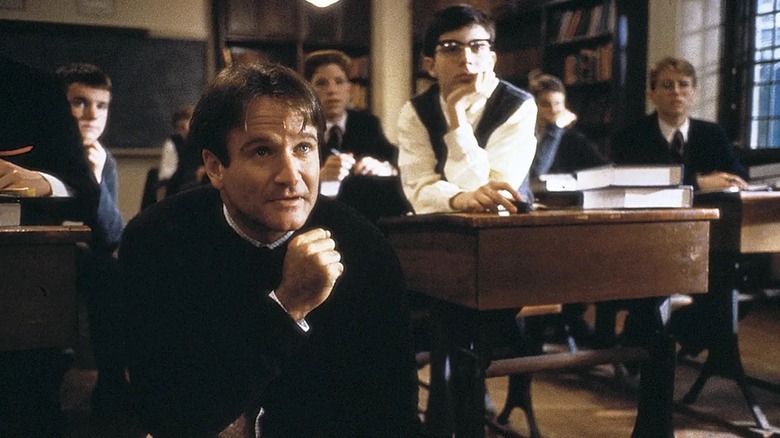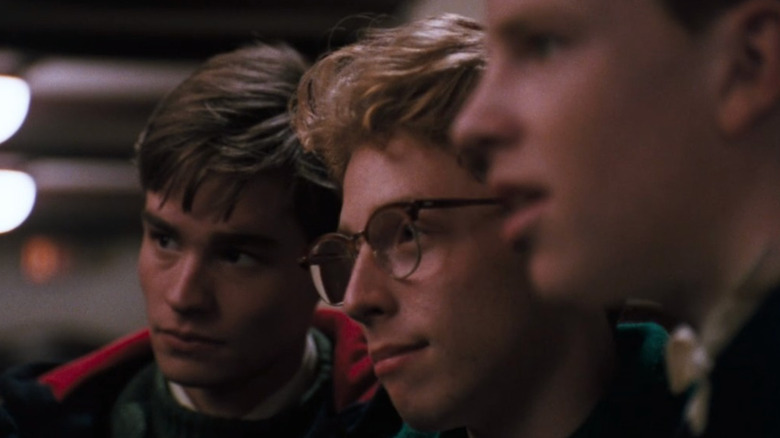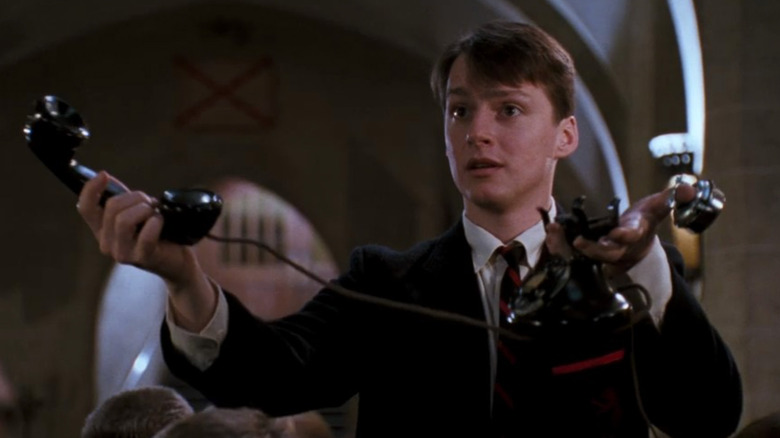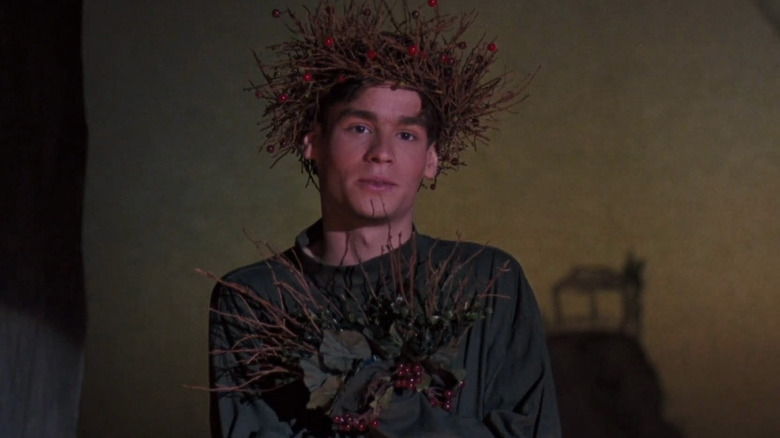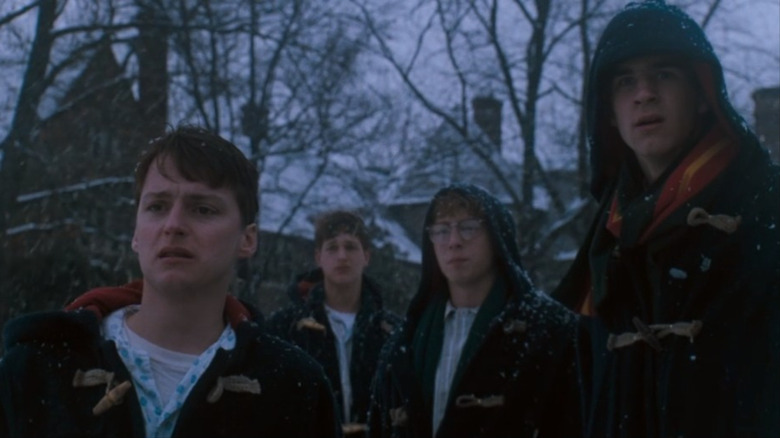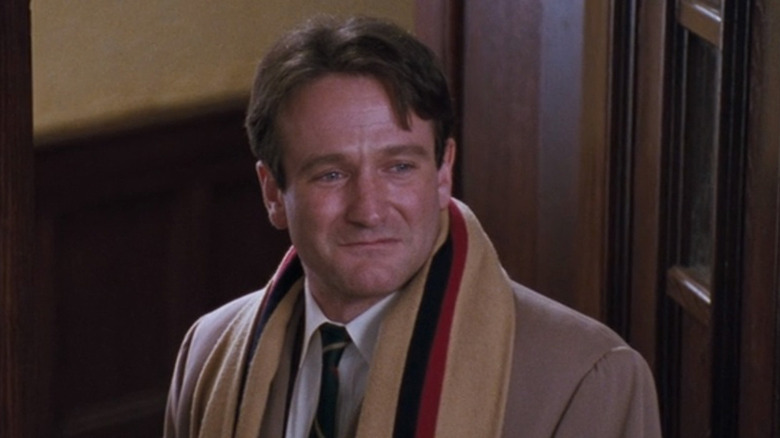Dead Poets Society Ending Explained: The Powerful Play Goes On
"Dead Poets Society" is one of a choice number of films that's defined almost entirely by its ending. That iconic final scene isn't easy to forget, even for those who watched the film for the first time in 10th grade English class or some such equivalent. The image of once-timid prep school boys standing atop their desks to pay tribute to their recently-fired English teacher, Mr. Keating (Robin Williams), is meant to invoke a sense of purpose. It's meant to stir up your emotions and stay with you for the rest of your life, even as the broad strokes of the film eventually fade into hazy memory. Without that "O, Captain, my Captain" moment, "Dead Poets Society" might have been a very different film. But it's not the only one that shaped the film into the classic it became.
Like with all good stories, the ending is merely a culmination of moments. It only packs such a punch because of everything that had to happen before it, and as pedestrian as the events of "Dead Poets Society" may seem — at least, leading up to the shocking suicide in the final act — a lot really does happen, if only beneath the surface. It makes "Dead Poets Society" so much more than a quintessential high school movie, including a commentary on a major societal shift, as well as the cycle of abuse perpetuated by a culture of toxic masculinity.
Words and ideas can change the world
Peter Weir's 1989 film takes place at Welton, a prestigious, all-boys boarding school with strict traditions and even stricter staff. The story begins as the class of 1959 descends onto campus for the fall semester. With the new academic year also comes a brand new teacher, Keating (a career-best Robin Williams), who makes quick work of radicalizing his first class of prospective lawyers and doctors. Keating himself once attended "Hell-ton," so he understands the trappings of its suffocating curriculum all too well. He wants these boys to find their voices while they're young. The longer they allow the toxic culture at Welton to suppress their spirits, the harder it will be for them to think for themselves when they reach adulthood.
Keating's unorthodox methods encourage the rebirth of his unofficial, one-time club: the titular Dead Poets Society. Keating and his peers first founded the group to escape the monotony of their day-to-day academia, to "suck the marrow out of life." It's a principle that makes a big impression on certain members of his class, namely Neil Perry (Robert Sean Leonard), his roommate Todd Anderson (Ethan Hawke), and friends Charlie Dalton (Gale Hansen), Knox Overstreet (Josh Charles) and Steven Meeks (Allelon Ruggiero).
Carpe diem
The newly founded Dead Poets Society adopts Keating's mantra, "carpe diem," in ways that only teenage boys can. Charlie is arguably Keating's most passionate disciple, staging elaborate campaigns to bring female students to Welton and even adopting a new moniker, Nuwanda. Knox uses the well-known power of poetry to win over a girl at a neighboring school. And then there's Neil, who seems like the last person in need of Keating's help, at least on the surface. Deep down though, the exact opposite is true: while he's a talented student and a natural-born leader, he frequently has to set aside his personal aspirations and do what his overbearing father (Kurtwood Smith) tells him.
In normal circumstances, Neil would concede to his dad without question. Until he graduates from Welton, then college and (eventually) medical school, his life is not his own. It's only after Keating's lessons start to sink in that Neil realizes he can live a different way, without submitting to his dad. He auditions for a local production of "A Midsummer Night's Dream" in an effort to take control of his life again. The only problem: he does so behind his father's back, and it backfires spectacularly when he discovers the truth and demands Neil drop out of the production.
It's this conflict that demonstrates Neil's half-formed approach to Keating's philosophy. Like other members of the Dead Poets Society, he largely fails to absorb the true essence of "carpe diem." Honoring your inner truth and shunting the status quo are both vital to seizing the day, but not without an understanding of the consequences. "There's a time for daring," Keating tells his class, "and there's a time for caution. A wise man understands which is called for."
If we shadows have offended...
Keating tries to encourage temperance and patience in his students, especially when Neil comes to him with his dilemma. In order for Neil to actually find the freedom he's been searching for, Keating says, he has to confront his father. Even if Mr. Perry can't empathize with his son, it isn't the end of the world. His "indentured servitude" won't last forever: soon he'll be free to star in whatever play he likes. It's a nice sentiment, but a totally foreign concept for Neil, who can't see beyond his own suffocating reality. He feels trapped no matter what he does, and that feeling only increases his desperation to break free.
This is, ironically, what makes Todd's role in the story so important. He's Neil's foil in every way, as both characters represent the different ways that shame can manifest within a person. Todd's shame keeps him putting his ideas and emotions out into the world. "Mr. Anderson thinks that everything inside of him is worthless and embarrassing," Keating very astutely observes. And Neil, for all his inner fire, is made to feel the same from his father.
Despite his projected confidence, Neil also struggles to prove his worth — he's just much better at hiding it. He is, as Keating later points out, a very talented actor. He's been acting his whole life, playing the part of the dutiful son, the Mr. Future Doctor of his dad's dreams. But after getting a taste of freedom, he realizes he can't keep acting any longer, especially not with the threat of military school — and 10 more years in "service" to his dad — looming over his head.
A quiet flame
After his final confrontation with Mr. Perry, Neil can only see one way to escape, to finally be free on his own terms. His suicide understandably sends shockwaves through Welton, and Headmaster Nolan (Norman Lloyd) works quickly to restore "order" in the wake of the tragedy. He implicates Keating in Neil's death, and threatens the remaining Society members with expulsion if they don't corroborate his story.
With Charlie expelled, Keating sacked, and Nolan poised to replace him as English teacher, the status quo is all but restored — and it's here that the focus shifts almost entirely to Todd. Out of everyone in the Dead Poets Society, he was the most resistant to Keating's teachings. Of all his friends, he was most likely to shrink away from a challenge. It's not until he's presented with the most difficult challenge of all — to honor truth, consequence be damned — that he's able to demonstrate a complete understanding of "carpe diem."
Keating sees his class for the last time when he returns to pick up the last of his belongings, and there, Todd finds the courage to come clean about Nolan's scheme. What happens next — that aforementioned "O Captain, my Captain" moment — is a symbol of the effect that Keating had on his students, Todd especially. He can't take back what he did (and he may very well face expulsion for what he does after) but the principles he's learned have lit a fire within him, and it won't be an easy one to snuff out.
O Captain, My Captain
"Dead Poets Society" contends with a tricky legacy today. Its status as a pop culture staple makes it overrated in some circles, and its focus on the white male elite — tragic as their individuals upbringings are — raises concerns about its lack of diversity. But these critiques come from examining the film through a modern lens. It's easy to dismiss the film for its female representation (or lack thereof), to pick at its one-note antagonists. But it's also important to keep the setting in perspective. "Dead Poets" takes place in the late '50s, when women were discouraged from pursuing higher education, and schools in general were less integrated. Post-War America had only just begun to move away from conservatism and embrace romanticism. It was a different time, and sure, most of the characters in the film are either archetypes or ciphers — but perhaps that's why it's still so evocative today.
"Dead Poets" deals with a period of time when most of us are trying to discover who we are. Life is hard, our emotions are overwhelming, and every setback feels like the end of the world. The film may feel cringey or old-fashioned now, but it's only because we've since learned to contextualize the suffocating bind of adolescence, or family drama, or unrequited high school love. If we try, we can probably still remember how it felt to hear Keating's mantra for the first time, or how it felt when our own teachers recognized greatness in us. "Dead Poets" has captured that feeling in a bottle. It serves as a reminder of some of Keating's best advice to his students (lifted from Whitman, of course): "That life exists, and identity. That the powerful play goes on, and you may contribute a verse."
